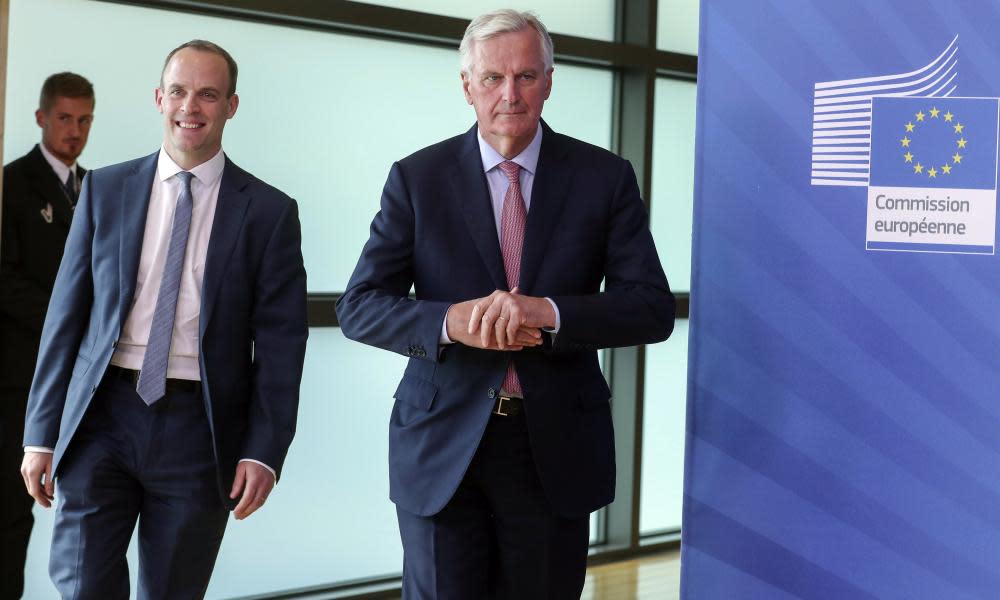Barnier welcomes Raab by stressing urgency of Irish border deadline

The EU’s chief negotiator, Michel Barnier, has welcomed Dominic Raab to Brussels with a thinly veiled critique of Theresa May’s Chequers plan and a 13-week deadline in which to solve the problem of the Irish border.
Appearing with Barnier for the first time in the Belgian capital, the new Brexit secretary, clutching a copy of the UK’s recently published Brexit white paper, called for more “vim, vigour and energy” in the troubled negotiations.
The former Foreign Office lawyer told reporters he was “looking forward to intensifying, heating up, the negotiations”, after stepping into the role following the resignation of David Davis over the paper, which sets out how the UK is effectively seeking to stay in the single market for goods by following a raft of EU laws.
The differing priorities between the two negotiators were clearly evident, however, as they stepped out in front of reporters together at the European commission headquarters.
While Raab conceded there were some “gaps” in the withdrawal agreement that needed to be filled, Barnier emphasised the “urgency” of finding a solution for the most thorny issue in that deal: avoiding a hard border on the island of Ireland.
Barnier told reporters: “We have a lot of work to do with out teams. There are, as you know, 13 weeks left, before the October European council. In this time, short time, we have two things to do. We must finalise the withdrawal agreement and we are not yet there on governance.
“We must also prepare a political declaration on our future relationship. On the withdrawal agreement it is a matter of urgency to agree to a legally applicable backstop on Ireland and northern Ireland. We need an all-weather insurance policy.”
He added: “On the future relationship, the EU proposed in March an unprecedented partnership not only in economic and trade where we want an ambitious free trade agreement that respects the integrity of the market but also on internal and external security, where a close partnership between us means more important than ever given the geo-political context.
“Our challenge will be to find common ground between the fundamental principles that define the EU and the UK positions. That is all for now, more is to come. Stay tuned.”
The two men took part in a short discussion on the UK’s white paper before dining together at the UK’s embassy in Brussels.
Barnier gave Raab the book Going to the Mountain by Nelson Mandela’s grandson, Ndaba Mandela, as a gift.
Raab, in turn, gave the former French minister a copy of Isaiah Berlin’s The Hedgehog and the Fox. The philosopher’s most popular essay explores the difference between thinkers who view the world through a single defining idea, and those who base their world view on experience.
It is understood that Raab also insisted to Barnier that the Brexit talks continue throughout the summer, despite the offer of a two-week break from the European commission.
The meeting came as the EU issued a warning to their member states in a 16-page document of the risks of a no-deal Brexit.
The document notes that the impact of a no-deal scenario would be “very real” for citizens, and even leaves open the possibility of a visa requirement for Britons travelling to the continent after Brexit should a deal not be in place..
A senior EU diplomat said the “very volatile” political situation in London and the lack of progress in the talks in Brussels on key issues had led many to believe that the risk of a no-deal scenario had increased in recent weeks.
“Contingency planning for the worst possible outcome is not a sign of mistrust in the negotiations,” the paper adds. “The commission is devoting very significant resources and committing great efforts to achieve an agreement. This remains our goal. However, the outcome of negotiations cannot be predicted.”
The document is particularly stark in its analysis of the impact on economies on both sides of the Channel.
It says: “Transport between the United Kingdom and the European Union would be severely impacted. Customs, sanitary and phytosanitary controls at borders could cause significant delays, eg in road transport, and difficulties for ports.”
The EU document also covers the movement of British citizens to the continent, noting that the country would need to be placed on one of two lists regarding a need for visa for travel. Asked about the unlikely outcome of UK citizens requiring a visa, an EU official responded that Brussels was leaving the issue open. “I cannot give you the answer today,” he said.
The document further points out that even if there is a deal, there would be changes in the way businesses traded.
An EU official said: “We have the impression that since a few weeks a no return point has been considered by a certain number of industrial sectors and that they are taking their decisions.
“You have seen some declaration of corporations saying that they are reconsidering investment, they relocating part of their activities, transferring their marketing authorisation for example for pharmaceuticals in the EU. This is ongoing.”
Barnier will discuss Brexit with European affairs ministers from the EU27 on Friday. An official said there would be a lot of questions on the white paper, which was “detailed but still unclear to a certain extent”.
Stressing the unpredictability of British politics, the senior EU official said they might as well “read the entrails of animals” to know what is happening.

 Yahoo News
Yahoo News 
